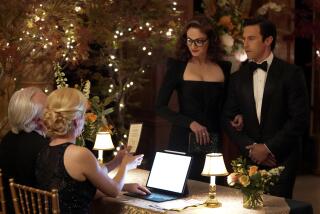Star Quotient
Every week on the CBS crime series âNumb3rs,â another chalkboard-filling calculation helps find a serial killer, solve a kidnapping or thwart larceny. On the show, the numbers are crunched by Charlie Eppes, a math professor at fictional CalSci played by heartthrob David Krumholtz. In real life, CalSci is a close facsimile of Pasadenaâs own Caltech and the computational heavy lifting is being done by the showâs math consultant, Professor Gary Lorden, the head of Caltechâs math department. We quizzed the professor about what itâs like bringing his passion for statistics and probabilities to the masses. And yes, thereâs going to be math.
OK, how many decimals of pi can you give me?
A few years ago, I memorized it to 15 or 20 places, I think 3.1415926. Iâm not as sure of the last two digits. I know some mathematicians who have memorized a couple thousand digits of pi just for fun.
In real life, how applicable is mathematics to actual crime-solving?
Itâs not only solving crimes. Itâs looking for terrorists. Itâs trying to make cryptography work in both directions, have your messages not [be] stolen by somebody else and stealing somebody elseâs messages. The National Security Agency hires more PhD mathematicians than any university or Microsoft or any of those other companies.
But would your average gumshoe be using number theory?
A lot of crime is corporate, white-collar crime that involves huge databases. Iâm consulting now for a firm whose service is to look at millions of documents in some sort of corporate fraud case and find the ones that need to be delivered to the other side, or that need to be looked at by prosecutors. And that would be true in crime investigation.
What formula do you think of as having star quality?
If I wanted to do a hit list, Kim Rossmoâs formula for defining the hot zone in a serial attacker. Thatâs applied math. At the other end of the spectrum, my colleague Dinakar Ramakrishnan put down some formulas characteristic of whatâs called the Riemann Hypothesis, formulas defining the Riemann zeta function, and Eulerâs Product. Those formulas are some of the most beautiful things in number theory.
What makes a formula âelegant,â a word that often is used on the show?
âEleganceâ is one of our special words, like âtrivialâ or âobvious.â We mean the reasoning, the process of getting from A to B to C, finally to X. An elegant proof conveys whatâs going on in a poetic [way]. Itâs sort of what Keats said: âBeauty is truth, truth beauty.â Some equations and algorithms [are] elegant because theyâve condensed in a beautiful way whatâs essentially going on. Itâs one of the highest compliments that you can pay.
Is there anything about the mathematician hero on âNumb3rsâ that is not true to math life?
Well, heâs not drinking coffee or Coke, and I can hardly think of a mathematician who doesnât, especially at night. The other thing is very few mathematicians listen to music while theyâre working, and [the showâs writers] really like the idea. So Charlie does put on headphones and listen to music.
Has enrollment gone up in the wake of âNumb3rsâ?
Caltech last spring did have a good year for applications, and I think a lot of people know that CalSci is really just a close approximation of Caltech. As a statistician, I was impressed that in this yearâs freshman class of 235 at Caltech, there were 36 students who said they were going to be math majors, which is about twice as many as weâve had before. Maybe there is a trend.
How well have the producers re-created the Caltech math department?
Theyâve done something really clever, which is to make an oil painting of me that looks just like the oil painting of Alfred P. Sloan, who gave the money for the math building at Caltech. It appears on their math department set in downtown Los Angeles as the donorâs oil painting.
The âNumb3rsâ whizzes are sexy and glamorous. Doesnât this fly in the face of the geeky mathematician stereotype?
Iâve got to tell you there are some extremely good-looking people in the Caltech math department. Itâs not that unrealistic.
More to Read
The complete guide to home viewing
Get Screen Gab for everything about the TV shows and streaming movies everyoneâs talking about.
You may occasionally receive promotional content from the Los Angeles Times.




